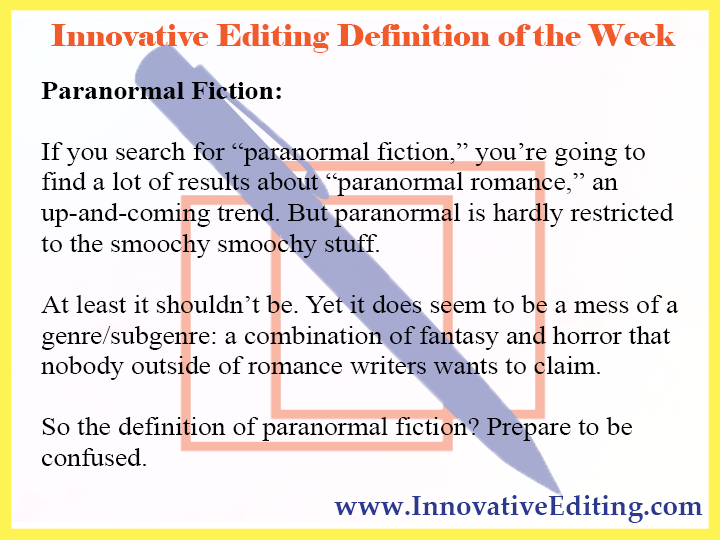
You might have to be dead (or undead) to truly understand the definition of paranormal fiction. Perhaps that’s the reason why it’s such a complicated wreck: because it’s a bunch of mere mortals trying to classify it.
I never used to look at it that way. Why should I when it was such a simple subject? Paranormal fiction was clearly all about ghosts and ghoulies and communicating with the dead.
So a movie like White Noise? That would be paranormal fiction. Even if it would be shelved with any old average horror film, it was still based on the supernatural realm: stuff beyond our control.
The same goes for The Mothman Prophecies, which incidentally was one of the most boring disappointments of my young life. I watched that thing at night, in my parents’ basement, all alone and with the lights off. Still wasn’t freaked out like I’d expected to be.
Total failure. Absolute waste of an evening.
But that letdown aside, it turns out I was both right and wrong about this genre. Which seems to be the norm for anyone trying to define paranormal fiction is, as shown by the Definition below and everything after it…
Paranormal Fiction
If you search for “paranormal fiction,” you’re going to find a lot of results about “paranormal romance,” an up-and-coming trend. But paranormal is hardly restricted to the smoochy smoochy stuff.
At least it shouldn’t be. Yet it does seem to be a mess of a genre/subgenre: a combination of fantasy and horror that nobody outside of romance writers wants to claim.
So the definition of paranormal fiction? Prepare to be confused.
Now, if you look up the word “paranormal” in the dictionary, it’s going to say something like this:
Of or relating to the claimed occurrence of an event or perception without scientific explanation, as psychokinesis, extrasensory perception, or other purportedly supernatural phenomena.
I normally love dictionary.com, which is where that exact definition comes from. But in my opinion, it’s not very helpful this time around, not to mention how it says absolutely nothing about ghosts and ghoulies.
Its sister site, thesaurus.com, is a bit more useful, listing off words like abnormal, celestial, ghostly, uncomprehensible (nope, I didn’t spell that wrong. It read “uncomprehensible. With a U, not an I), unearthly, metaphysical, mysterious, mystic, occult, phenomenal, preternatural, psychic, spectral, and transcendental.
So that does include mention of ghosts. And when you put “fiction” after the word “paranormal,” all of a sudden, you can find even more stuff about them.
However, you also find references to witches, vampires, werewolves and the like – a list that begs the dignified question of…
Huh?
Look up “supernatural fiction,” and you’ll find the same exact description.
Double huh.
Because that sounds a whole lot like fantasy fiction, doesn’t it? Particularly urban fantasy or contemporary fantasy.
This is why I started out the post by calling it a “complicated wreck.” And why I wondered whether only the dead (or undead) can understand the definition of paranormal fiction.
This is certainly a genre worth exploring, though I’m not promising you’ll end up any less confused by Friday.
Consider yourself officially warned. Now let’s go track down some ghosts and ghoulies.
The perplexing adventure continues on Thursday…

